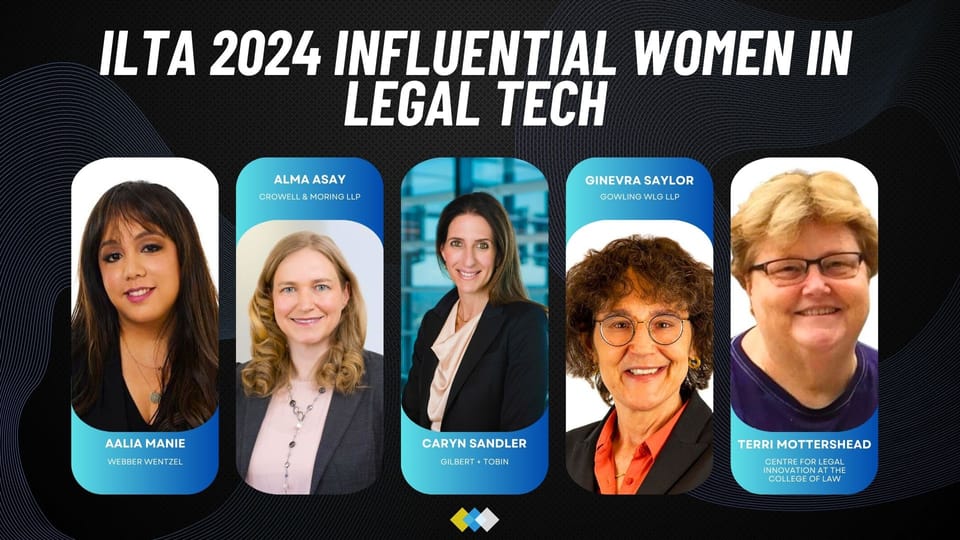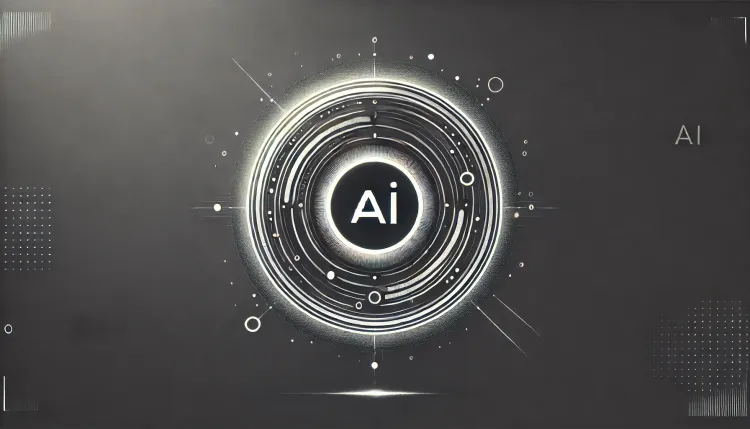2024 ILTA Influential Women In Legal Tech

Recently, ILTA announced its 2024 Influential Women in Legal Tech honorees. These five winners were selected from over 120 nominations and over 80 applications.
In the press release, Joy Heath Rush, CEO, ILTA said:
"Congratulations to this year's winners of ILTA's Influential Women in Legal Technology award! This group of five global powerhouses, representing five countries on three continents, demonstrates a commitment to applying technology to achieve innovation in the practice of the law. This year's winners are all lawyers—the first time that has happened in the award's history. This truly embodies the intersection of technology and the law. Thanks to the winners for their invaluable contributions to the advancement of the profession! "
These are exceptional individuals, and we reached out to get a deeper view of their personal motivations; what they think is the biggest challenge for legal professionals; and, the role of AI in legal practice.
Here are the questions that were shared with each winner. Responses follow in alphabetical order.
- Personal Motivation Behind Your Work: What drives your passion for merging law with technology? Was there a pivotal moment or influence that steered you towards focusing on legal tech innovation?
- Challenges & Solutions: The intersection of law and technology presents unique challenges but also opportunities for transformative change. What do you see as one of the biggest challenges facing legal professionals today in adopting new technologies, and what strategies would you suggest for overcoming these hurdles?
- The Role of AI in Legal Practice: AI is reshaping many aspects of legal practice. How do you envision AI continuing to transform the legal profession, and what considerations should be prioritized as this technology advances?
Alia Manie, Head: Webber Wentzel Fusion, Webber Wentzel
Personal Motivation Behind Your Work:
I've always loved figuring out how things work and making them better. I also loved practising law and finding creative solutions for clients. So, when I saw the potential for technology to make law better (remove tedious tasks, reduce errors, and generally make the lives of lawyers easier), I had to dive right in. My goal is to find solutions that give my peers and clients the freedom and time to focus on what matters most: delivering strategic legal advice and truly serving their businesses and stakeholders.
Challenges & Solutions:
One of the biggest hurdles is that some lawyers remain hesitant to embrace technology – and that's understandable. Tech should simplify work, not complicate it. The key is empathy. We must really listen to our users and involve them in solution design from the earliest possible stages. We should prioritise intuitive interfaces and solutions that seamlessly fit into existing workflows. By focusing on the real pain-points lawyers face and delivering solutions built with them in mind, not just for them, we can achieve real adoption.
The Role of AI in Legal Practice:
AI has incredible transformative potential. We already live in a world where AI simplifies routine drafting and pinpoints risks and hidden insights in datasets, and it's only going to get better from here. Beyond the obvious concerns about confidentiality, privacy, bias and responsible use, we should be proactive about client education and engagement on AI.
Alignment is key to ensure trust, common understanding and mutual success. We should also remember that it's about augmentation, not replacement. Human lawyers and their expertise are irreplaceable and the human touch still matters. In fact, human judgment and empathy are more valuable in a world where a lot of the rest could be automated. We should prioritise the irreplaceable strengths of human lawyers: understanding complex contexts, exercising sound judgments, building relationships of trust, and understanding the human concerns that often sit behind the legal issues.
Alma Asay, Chief Innovation and Value Officer, Crowell & Moring LLP
Personal Motivation Behind Your Work:
My passion is to see people thrive at what they do. That’s hard when you’re unnecessarily bogged down by inefficient ways of doing less fulfilling work. We talk about “legal tech,” but I’m focused on “legal innovation” more broadly. Working smarter doesn’t have to be driven by technology and, when it is, technology is often the last piece of a more complex puzzle. My pivotal moment was taking the leap into founding a legal tech startup, knowing nothing at the time about tech or entrepreneurship. I just thought there “had to be a better way” to do things I was trying to do as a lawyer.
Challenges & Solutions:
The biggest challenge I see facing legal professionals in adopting new technologies is the number of demands on their time. We all only have 24 hours in a day, our inboxes are flooded, our calendars are booked, we have unanswered calls, texts, Teams messages…it goes on and on. Most legal professionals I know struggle to find time even to do the things they want to do – and, believe it or not, adopting new technologies is often something they want to do. Worse, it’s not just a matter of finding time on the calendar, but also the mental bandwidth to learn something that may not come naturally to them.
Instead of having empathy for this struggle, many in the industry accuse legal professionals of being anti-change, which doesn’t help the cause. To overcome this hurdle, we have to be better at meeting legal professionals where they are, including conveying information and reminding them of the existence of new technologies in the moment and format that are most likely to resonate with them – even where it makes the process less efficient for us!
The Role of AI in Legal Practice:
I envision that AI will both underperform and overperform against what people think today. This will shake out as we get better at identifying the right use cases for it. There are certain use cases in legal for which it’s brilliant and others for which, when you really stop to think about it, it makes no sense. Our priority needs to be balancing experimentation with critical thinking about where AI really shines and adds value. For the past year, it has seemed that AI is the hammer and everywhere people look, they see a nail. We have other tools in our toolkit and something is not made better with AI just because it’s a task that makes you miserable. By the same token, if you’re a technology company, it’s okay not to use AI (assuming AI doesn’t actually add value to the problem you’re trying to solve)!
Caryn Sandler, Partner + Chief Knowledge and Innovation Officer, Gilbert + Tobin
Personal Motivation Behind Your Work:
I have always been a person motivated by continuous improvement and learning so I suppose combining law (as a previously practising lawyer) with technology is a natural extension of that passion. I have found my role combines my deep understanding of law and practice, strategy and a commercial mindset. I cannot say that my career was planned – it was more about being in the right place at the right time during a shift in the legal landscape but it has been very fulfilling.
Challenges & Solutions:
The perceived value of legal technology (and innovation more broadly) can remain a barrier for some time-poor legal professionals who (understandably) prioritise substantive legal work over upskilling and adopting new processes and technologies. I constantly challenge the assumption of leveraging legal technology and innovation as ‘nice-to-haves’, and instead position these capabilities as essential, expected elements of high-value legal service delivery. This paradigm shift must be supported by developing the right culture - this is critical in any transformation and requires grit and determination.
The Role of AI in Legal Practice:
AI has historically had patchy uptake and effect on legal practice. But with the rapid and continued development of generative AI, we are going to see this technology far more heavily adopted over the next years with a significant impact on the way in which legal services are delivered. As generative AI will become increasingly available across generalised technologies as well as legal domain-specific technologies, there is potential for sincere transformation for how we work.
To maximise this potential, it is critical that lawyers continue to focus on understanding how to use these technologies to reduce the friction of day-to-day work and deliver the best outcomes. Don’t stray from the basics of identifying potential use cases and pain points, then mapping the AI technology against those opportunities. Consider your current technology ecosystem, speak with your existing vendors about how they are embedding and integrating generative AI into their platforms, and then look to other use cases out there in the broader market to see what you might need. All of this must of course be accompanied by carefully considering and implementing suitable processes and policies around IT, security, data ownership and usage, responsible use, and governance (to mention a few).
Ginevra Saylor, National Director, Innovation and Knowledge, Gowling WLG LLP
Personal Motivation Behind Your Work:
When I started out as a lawyer, legal technology was in its nascent stage. Online legal research applications were just being made available when I was in law school and by my eighth year of law practice, most lawyers did not have computers on their desks. So, for much of my ten years as a practicing lawyer, I continually lamented, “There has got to be a better way!” Surely and soon enough, there was. I was delighted to see the practice tools I had long dreamed of having at my disposal becoming a reality. I immediately wanted to be part of what was happening and shifted my career from practicing law to helping other lawyers practice more effectively, efficiently, and accurately. Refocussing my career on legal technology, knowledge management, and innovation has given me the opportunity be part of shaping the design and direction of legal technology, practice management, process improvement, and client service delivery.
Challenges & Solutions:
The biggest challenge I see with lawyers’ adopting legal technology comes from simply using new technology without taking the opportunity to first re-examine their processes with a keen eye to re-engineering those processes to incorporate the technology optimally and improve the overall delivery of services to the client. Plugging technology into sub-optimal processes not only decreases the likelihood of successful adoption in both the short- and long-term, but also reduces the potential return on investment from and satisfaction with that technology. Every new technology implementation should seize the golden opportunity to re-evaluate and re-engineer the associated processes and workflows.
Personally, I am a strong proponent of using legal design thinking and mapping the client’s journey as an effective way to reveal the pitfalls in current state processes and creating a better future state. But, regardless of the methodology, the important step to take is to create new processes that incorporate both the new and existing technologies into the lawyers’ work in the best possible way.
The Role of AI in Legal Practice:
I am very excited and hopeful about the challenges and opportunities that artificial intelligence and generative artificial intelligence are bringing to our industry. I believe we are on the cusp of a new era for the practice of law; Ai will truly transform most – if not all aspects of law practice, and help us substantially broaden access to justice in a meaningful way. As AI and genAI replace more aspects of our work and free up more of our time to turn our attention to new and uncharted directions, I am eager to see what our human minds will be capable of creating working alongside artificial intelligence. The challenge will be in thinking through potential ramifications to ensure we pursue only those avenues that lead to productive and positive outcomes.
Terri Mottershead, Executive Director, Centre For Legal Innovation at the College of Law
Personal Motivation Behind Your Work:
I’m a self-confessed geek and a former practising lawyer, so the combination of legaltech, AI and innovation takes me to my happy place! I’m in awe of what can be achieved particularly with GenAI in legal right now. It’s a game changer for lawyers, allied legal professionals, and clients. I’m passionate about supporting that transformation and bringing the business and practice of law into this century by matching talent and tech/AI so law and lawyers are more accessible to everyone.
Challenges & Solutions:
Our biggest challenges are fixed mindset, absence of agility/focus on continuous improvement and a limited willingness to experiment (read here, not being comfortable with failure) – all that needs to change, and it is, but that need is bigger and faster than ever before! Lawyers and the practice of law have adapted over time but advances in tech, particularly GenAI, has brought about a depth, breath and pace of change like nothing we have never seen before and, we’re not ready for it, not yet.
So how do we get ready, what should our strategies be? We need to lean into our intellectual curiosity, our inherent love of knowledge and learning, our skills in complex problem solving, and be willing to apply those to different things in different ways. Tech is a tool, it does not replace our humanity, nor does it change why most of us chose law as a career, to serve. So, we should double down on what we have always been good at but within a different/new/contemporary context and accept that we can’t advance along the path without tripping over a few stones along the way.
The Role of AI in Legal Practice:
AI is transforming everything we do and how we do it in legal practice. There are real challenges to the big things like strategic/business planning, competition, business models and leadership capabilities. But all the operational stuff has changed too e.g. how we work, what we do, where we work; how we value legal services; pricing; talent / capabilities / multidisciplinary teams; and how we define and manage risk. So much change and so little time - it can feel overwhelming.
For me, the starting point is always clients – what’s changing for them and how can we support them? We should not assume the answer to these questions is always tech. It may not involve any tech. So, chat with your clients and understand their needs and expectations and make sure your business practices and services/products/solutions match their needs or preferably exceeds them.
In a nutshell, it’s about prioritising ask and listen over show and tell. Developing what’s needed in collaboration with your clients. Making decisions based on data. Getting the right people from your organisation/firm around the table to determine the best solutions - that’s going to mean a whole bunch of skill sets from a whole lot of different professionals with lawyers being one of many in that group. It’s also going to require understanding and using a new common language founded in digital literacy. And then, when the solution is developed, it also knowing it won’t be set in stone – everything will continue to evolve so your processes, systems and tech needs to accommodate that new, agile reality and you need to be vigilant and proactive about having the capabilities to deliver on it.
We thank each of the winners for taking the time to discuss the topics above in depth. Their journeys, accomplishments, and drive to advance legal innovation are inspirational.






Become a Fringe Legal member
Sign in or become a Fringe Legal member to read and leave comments.
Just enter your email below to get a log in link.